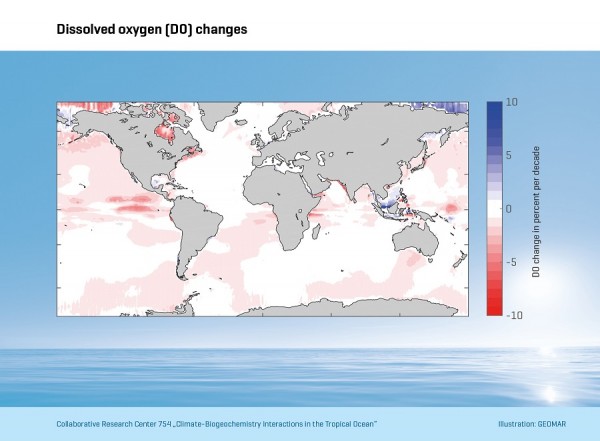By Ana Verayo, | February 20, 2017

Changes of dissolved oxygen in the global ocean in percent
Scientists are now able to measure how much oxygen is lost in a new study. Researchers were able to collect data about the global loss of oxygen and how the world's oceans go through a process called de-oxygenation.
A team from the GEOMAR Helmholtz Centre for Ocean Research in Germany now suggests that ocean oxygen levels are decreasing all over the world. The major culprit is manmade activity leading up to global warming and climate change.
Like Us on Facebook
Due to rapid warming around the world, ocean surface temperatures also increase as warmer water in turn absorbs less oxygen compared to cold water. When the ocean warms, this leads to more stratification and can prevent upwelling and vertical currents. This means that when deep ocean currents do not mix well enough, less oxygen molecules get distributed from the surface.
Past studies have presented models of rising ocean temperatures that resulted in small scale oxygen loss. According to oceanographer Sunke Schmidtko of the Helmholtz Centre for Ocean Research, in order to quantify trends for the entire world's ocean, this became more difficult since it was hard to collect data from remote regions like the deep ocean with sparse oxygen.
For the first time ever, the team was able to document oxygen distribution along with significant changes in the entire ocean. These numbers are a crucial prerequisite to improve forecasts when it comes to the future conditions of global oceans.
By building a global model applied with historic oxygen data including modern day ocean observations, new findings revealed that oxygen levels have significantly decreased in all the planet's regions in the last 50 years.
The worst region suffering from oxygen depletion is in the North Pacific. Scientists suggest that that this can also be caused by natural forces however, the team also agrees about current climate change model predictions of oxygen loss in oceans.
With this new analysis, researchers hope to improve oxygen loss models when it comes to global oceans and also to address the shifting distribution of oxygen in different parts of the ocean that can harm marine ecosystems. This new study is published in the journal Nature.
-
Use of Coronavirus Pandemic Drones Raises Privacy Concerns: Drones Spread Fear, Local Officials Say

-
Coronavirus Hampers The Delivery Of Lockheed Martin F-35 Stealth Fighters For 2020

-
Instagram Speeds Up Plans to Add Account Memorialization Feature Due to COVID-19 Deaths

-
NASA: Perseverance Plans to Bring 'Mars Rock' to Earth in 2031

-
600 Dead And 3,000 In The Hospital as Iranians Believed Drinking High-Concentrations of Alcohol Can Cure The Coronavirus

-
600 Dead And 3,000 In The Hospital as Iranians Believed Drinking High-Concentrations of Alcohol Can Cure The Coronavirus

-
COVID-19: Doctors, Nurses Use Virtual Reality to Learn New Skills in Treating Coronavirus Patients







